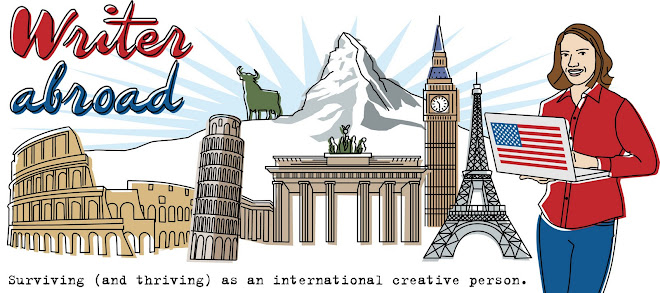In honor of the May 1 "Day of Work" holiday, Writer Abroad would like to discuss working abroad. She gets a lot of questions
from copywriters hoping to just that. So she has complied some of these
questions and posted the answers here in hopes that they will help more than
just the person who asked them.
How
does one apply and interview for jobs overseas while living in the US? Is that
even possible?
 |
| Nothing like an American copywriter writing headlines for a very Swiss brand. |
The most efficient way (without an already established network abroad) to find work abroad is to find work at home
first. Work for a few years for a company in your home country
that has a global network. Then, once they know and like you, ask to be
transferred to one of their offices abroad.
Are
you considered an expert because of your native English abilities, or is it a
hurdle to climb in the workplace?
Yes and no. I think this depends on what
country you work in. In Switzerland, many people speak English and some
non-native speakers think they know more than you—some of them do—at least when
it comes to understanding the grammar behind what they are saying! But in general,
yes, you are considered an expert. However, it can be a hurdle in the workplace
as far as opportunities because you are limited to working on accounts that
need English and you can also be treated as an outsider—or at least feel like
one at many occasions during a typical office day.
What
agencies should I look into if I were interested in leaping the pond?
Agencies with global networks. Think
McCann Erickson. Publicis. Euro RSCG. Y&R. Saatchi & Saatchi. Leo
Burnett. The possibilities are endless as even if agencies don’t appear to have
a large network, they are probably owned by a holding company that does have a
large network behind it. Do your research.
Do
you know where I could look for more entry-level copywriting work in
Switzerland? Most ads I have found online are either for “senior” positions or
strictly for marketing work?
Writer Abroad’s recommendation is to try
to do your entry-level work and training in your home country. In Switzerland, teenagers are
trained as creative interns within an agency and then they get their first jobs
at about 18-20 years old. It is a very different system than in most
English-speaking countries. Also, native English copywriters in Switzerland are usually needed for global accounts and are expected to have some experience.
Anyone
else have questions or different answers to these questions? Leave a comment.

